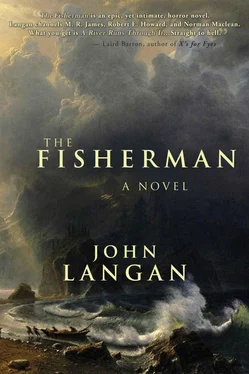Sounds a bit much, doesn’t it? Not that the whole story doesn’t sound more and more fantastic — walking dead woman and all. It’s just those tadpoles, they’re — well, they push the tale that much closer to outright fantasy, don’t they? (That’s assuming, of course, you don’t think it’s already there.) Myself, I’d be inclined to believe that George had quenched his thirst at one of the local ponds after a bout of drinking, swallowing a school of tadpoles — plain, ordinary tadpoles — in the process. When he throws up, out come the tadpoles, which, to be sure, would be a pretty disturbing sight in and of itself. The monster-tadpoles I’d chalk up to the overheated imagination of the girl who told Lottie the story. Problem is, I’m not as sure as I’d like to be. You see, the same night that Lottie hears this story, after Clara has revealed what she’s learned about the man in the big house, and Rainer is chewing over the information at the kitchen table, rubbing his jaw the way he does when he’s thinking, Lottie comes right out and asks him if the story she was told is true. She’s that kind of girl.
Rainer jumps up from his chair as if he’s been stung. At first, he looks surprised, as if he can’t believe how his daughter heard such a story. Then the anger comes, such anger as Lottie hasn’t seen on his face in a long time, maybe ever. She can see his right arm twitching, and she’s sure he’s going to hit her — for the truth or the lie of her question, she doesn’t know. Lottie tenses herself for the slap, and that’s when Clara, who’s been standing to the side watching, steps in front of her. Lottie can’t see her mother’s face, but whatever’s in it washes the anger clear from Rainer’s. His arm relaxes, his head slumps, and Lottie realizes that underlying the anger she’s been the focus of is fear, a terror deep and profound. She thinks of the other night, what she saw in her father’s eyes after Italo left. All of a sudden, she has one of those moments you have growing up, when you see your parents as people, as something like older versions of you and your friends. From head of the household, Rainer becomes a man whose heavily lined face and thinning hair are the badges of too much care and worry. Lottie understands that the fear she’s found in him is not a new thing, that it’s been part of her father for a while now. If not originally part of his fundamental architecture, then it’s infiltrated him the way termites will devour the frame of a house, leaving only the brick exterior in place. And from mother, Clara becomes a woman whose worn hands mark the effort she’s put into holding together not only the family she and Rainer have made, but Rainer himself. Lottie sees that Clara knows all about Rainer’s fear, that if her mother has been unable to exterminate what’s wormed its way into her husband, she’s at least done her best to support him where she can. A burst of sympathy, of pity compounded by love, takes hold of Lottie, and she wants to throw her arms around her parents and comfort them. She doesn’t, though, because she also wants to protect them from her revelation.
“This is bad business,” Rainer says at last.
This isn’t exactly the revelation of the year. Before Lottie can ask Rainer what the bad business is, Clara does. “Enough riddles,” she says. “We know bad things are happening. What do you know about them? Who is the man in the big house?”
“I don’t know,” Rainer says, “I don’t know who he is.”
Lottie sees her mother’s shoulders straighten, a sure sign she’s ready to yell, so she steps in with her own question: “What is he, Papa?”
Rainer’s face falls; he didn’t expect that one. It’s as if he’s decided he won’t lie to his family. He simply won’t tell them any truth he doesn’t have to. “I’m not sure what he is,” he says.
But Lottie’s started to figure out the rules to his game. “What do you think he is?” she asks.
When she was a child growing up in Germany, she played a game like this with Rainer, a game whose object was to find not only the correct question, but the correct phrasing of it. Lottie was good at that game, which she thinks about now. Maybe Rainer remembers it, too, because as she re-words her question into a form he can’t evade, the faintest of smiles crosses his lips. “All right,” he says, “all right. I’ll tell you what I think. I think — I am afraid the man in the big house might be ein Schwarzkunstler.”
He uses the German, even though they’re all speaking English, a house rule Rainer himself has insisted on. Lottie knows the word, which translates “black artist” and means something like “black magician” or “sorcerer.” It’s a word Lottie associates with childhood stories from the old country, not real life in a construction camp in upstate New York. For a moment, she thinks Rainer is having her and Clara on, then she sees that he’s crossed his arms, something he only does when he’s presenting an uncomfortable truth. He did it when he told the family that he thought the only recourse left them was to leave their home and go far away, maybe to America, and again when he described the fine job he’d taken in the beautiful country north of the City. Her skeptical father is telling Lottie and her mother that an evil magician is behind the strange goings-on next door and expecting them to believe it. “Ein Schwarzkunstler?” Lottie says. “Like in the storybooks?” The tone of her voice shows her opinion of her father’s theory.
“Not exactly,” Rainer says. “More a kind of,” he waves his hands, “scholar, or surgeon, or — or a strongman, at the circus.”
“A surgeon?” Lottie asks. “A strongman?”
“Someone who slices into the surface of things and peels it away to discover what is underneath,” Rainer says. “Someone who wrestles with powerful forces.” This doesn’t help Lottie in the least, which Rainer sees. He says, “The result would be the same as in the books.”
Clara, meanwhile, is slowly nodding her head. When Rainer has finished speaking, she says, “It explains all of this, doesn’t it? God help us.” Then, to Rainer, “What are you doing about it?”
“Me?” Rainer says.
“You,” Clara says.
“Why should I do anything?”
“Because who else knows about these things?” Clara says.
“I’m hardly an expert,” Rainer says.
“You’re what’s at hand,” Clara says. “Besides, you’ve done well enough in the past.”
“I don’t think Wilhelm would agree with you,” Rainer says. There it is, suddenly: that name. Lottie’s never heard it said out loud before, only caught it in whispers from Rainer and Clara.
But if Rainer thinks bringing up this name will stop the conversation, he’s mistaken. Clara steams ahead: “Wilhelm understood what he was doing.”
“I don’t think so,” Rainer says, “I don’t think either of us did.”
“That’s the past,” Clara says. “Let the dead bury the dead. You have the living to worry about. Are you telling me that, since that woman appeared, you’ve been doing nothing?”
Rainer resembles the little boy caught with his hand in the cookie jar. “I have been looking at the books,” he says. “After everyone’s gone to bed.”
“I knew it,” Clara says.
“It’s not as simple as all that,” Rainer says. “It’s not like looking up the dictionary for ‘Schwarzkunstler.’ The books are difficult to read. The meanings are hard to follow — it’s like they’re written in code. The words keep shifting themselves. They don’t want to give up their secrets. It’s like an oyster with a pearl.”
“You can make an oyster surrender its pearl,” Clara says. “All you need is persistence and a sharp enough knife.”
Читать дальше












